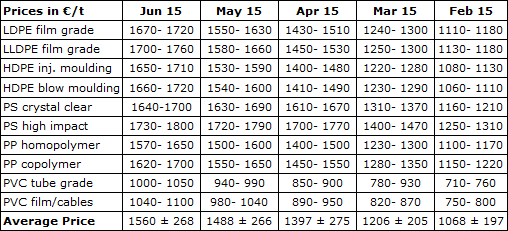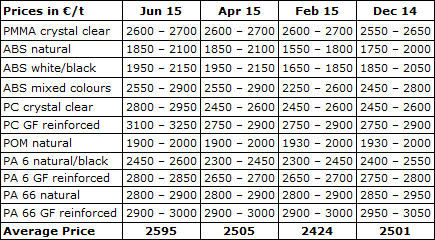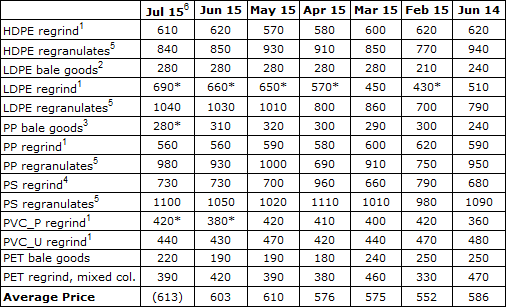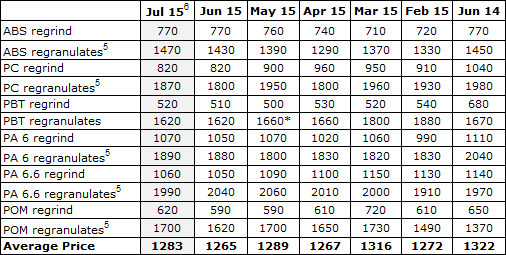Market Report Plastics - July 2015
Information about the market for plastics is being presented by:
bvse - Bundesverband Sekundärrohstoffe und Entsorgung e.V.
1. The market for primary plastics
Good news from the ifo Business Climate Index, cf. www.cesifo-group.de: the ifo Business Climate Index for Germany’s trade and industry has climbed from 107.5 points to 108.0 points in July. Surprisingly, the mood in the German economy has improved during the summer break. Companies are optimistic about prospects for the next half-year.
However, it is astounding to observe the increasing scepticism that plastics are faced with. This primarily applies to the European Directive on reducing the consumption of plastic carrier bags. Among others, the study ‘Plastics flood in Germany will swell considerably until 2030’, which was conducted by the German Nature and Biodiversity Conservation Union (NABU), continues this theme. The study suggests stopping the plastics flood through special tax levies, see www.nabu.de. Plastics enable us to cut down considerably on energy and raw materials, including non-ferrous and ferrous metals, wood, paper, cardboard and cartons in particular, but also cement and glass. Above and beyond this, plastics lacquers and laminates considerably extend the materials’ life cycle period. Politicians and society are often unaware of the manifold advantages involved in using plastics in all sectors of day-to-day life.
1.1 Standard plastics: Despite the low oil price, which has amounted to an average US-$ 61.7 per barrel over the past 100 days, primary plastics prices have been rising continually since February. Since that time, the listings for standard plastics have increased by large gradations, i.e. by 138 €/t, 191 €/t , 91 €/t and 72 €/t, cf. Table 1.The aforementioned monthly price rises form a classic growth curve that, if extrapolated to the future, will attain its peak level in September.
For a more detailed discussion, including information on the price indices for virgin materials and used plastics as well as precursors, please refer to EUWID Recycling and Waste Management and EUWID Plastics, cf. www.euwid.de, as well as KI Plastics Information, cf. www.kiweb.de.
The EUWID listings show that the plastics price is now completely unrelated to the mineral oil price. Mineral oil and precursor prices are low, too. Standard plastics developments continue to be subject to force majeure. For example, there are still considerable shortages of a number of standard plastics. As a result of plant failures, there is lack of capacity, and virgin materials are in short supply. On the other hand, there is considerable demand for plastics. For the first time in a long period, all standard plastics prices have exceeded 1000 €/t again. Since April, monthly price rises in PS have been relatively moderate compared to other types of standard plastic. The packaging PET price has remained unchanged at 1310 €/t compared to the price for the previous month, which averaged 1320 €/t.
Table 1: Standard plastics prices according to EUWID over the past five months, listed in €/t.

1.2 Technical plastics: In February, the falling mineral oil price also drew the listings for technical plastics down. In April, prices leapt upward by 81 €/t as a result of force majeure, i.e. production failures in particular; in June, they climbed by another 90 €/t. Prices were last reported to reach similarly high levels in June 2012. According to experts, supply of and demand for technical plastics are balanced to a greater extent than previously. Nevertheless, prices are likely to rise once again in August.
Table 2: EUWID prices of standard plastics, which are published every two months, over the past six months; listed in €/t

2. The market for secondary plastics
To date, the price indices for secondary plastics have reflected force majeure only to a moderate extent. Plastics processors are desperately looking for recyclates – in sufficient quantities and in continually good quality – in order to supplement their virgin materials advantageously. Recyclates are now readily accepted by plastics recyclers, who are also willing to adjust their processing techniques accordingly. This clearly reveals the buffering effect of plastics recycling: recyclates stabilise the primary plastics market. However, plastics recyclers could achieve much more if they were not losing such a lot of material to waste incineration, on the one hand, and to the export trade with the Far East, on the other.
Unfortunately there are still a large number of EU member states that do not make a really positive contribution to plastics recycling. There is still a lack of effective waste collection facilities, sorting plants and processing or recycling plants in numerous member states of Europe. While the People’s Republic of China has been purchasing and successfully processing used plastics from all across the world for many years, the EU member states are still unaware of the intrinsic value of this material flow.
Plastics recycling is still suffering from the shortage and high cost of processing input. In addition, the quality of processing input is still insufficient. Germany’s quantities of collected and sorted materials are still being consciously reduced and are thus no longer fully available to plastics recyclers. Plastics recyclers thus depend on imports of plastics processing quantities from abroad and continue to be short of processing input of acceptable quality. Above and beyond this, they are having difficulty in raising recyclate prices adequately – and that despite force majeure.
While plasticker indicates stable prices for June and July, EUWID reports reveal that force majeure has had an impact on PE and PP. According to EUIWD, price rises in olefins average 14 €/t, while primary plastics prices have increased by 72 €/t.
2.1 EUWID Price Watch
In June, force majeure had a high impact on waste plastics, too. There was considerable demand for high-quality PE and PP in particular. Polyolefin prices went up by an average 14 €/t, reaching price rises of 10 €/t to 50 €/t. In some cases, prices fell by 10 €/t to 30 €/t. Prices changed according to each type of plastic.
Post-industrial PE prices rose by an average 19 €/t: HDPE mixed colours 600-700 €/t, HDPE natural 680-830 €/t, LDPE mixed colours 480-670 €/t, LDPE natural 70-850 €/t, LDPE film grade mixed colours (K49) 240-360 €/t and LDPE film grade natural (K40) 500-680 €/t. In the case of LDPE, prices fell by no more than 30 €/t in the lower price range, while they rose by 50 €/t in the upper range.
The following post-user PE grades increased by an average 7 €/t: LDPE shrink film natural (E 40) 550-580 €/t, LDPE shrink film mixed colours (E 49) 240-330 €/t, film transparent natural <70 µm 420-470 €/t, HDPE regrind from crates, colour-separated 700-850 €/t and HDPE regrind from crates, mixed colours 570-670 €/t. Shrink film prices climbed by an average 20 €/t, whereas the other film grades held their own.
Post-industrial PP is in great demand. This also applies to post-user PP, which is, however, not listed by EUWID. The listings for post-industrial PP rose by an average 23 €/t: film grade mixed colours (K 59) 150-250 €/t, film grade natural (K 50) 350-500 €/t, homopolymer mixed colours 510-680 €/t, homopolymer natural 680-850 €/t, copolymer mixed colours 510-680 €/t and copolymer natural 680-850 €/t.
Once again, PVC prices held their own. The price rises from the primary market did not have any impact on the secondary market. Thanks to the developments in the building and construction sector, there is considerable and stable demand for PVC. PS, too, is benefiting from the boom in the building industry. Post-industrial PS has held its own.
Over the summer months, the supply of used and disposable PET beverage bottles has increased considerably. PET recyclers now have sufficient supply. However, beverage bottle prices have soared, too. Recyclate prices could only be raised to a limited extent. Recyclates, including flakes and regranulates, are selling well. In June, the following beverage bottle prices were quoted by EUWID: PET transparent 160-175 €/t and PET coloured 25-40 €/t. Thus, the price of transparent PET bottles clearly rose by an average 10 €/t, while PET coloured increased by 5 €/t.
2.2 plasticker price index
The plasticker internet platform, see http://plasticker.de, publishes quotes on an hourly basis. The present market report indicates the final monthly prices. It is only possible to represent the preliminary prices for July 2015. These listings thus merely reflect an interim situation that does not become definitive until August 2015. Plasticker offers the quality grades regrind and regranulates both as virgin materials and as secondary goods. The term ‘bale goods’ refers to waste plastics only.
Standard plastics
In June, the standard plastics prices listed by plasticker changed only slightly compared to the previous month, reaching 603 €/t. There were moderate price changes in the individual quality grades. Thus, price rises ranged from 10 €/t to 50 €/t and price falls from 10 €/t to 80 €/t. While the listings for HDPE regrind rose by 50 €/t, HDPE regranulates lost 80 €/t. LDPE regranulates have been peaking since May. The relative stability in PP quotes is somewhat surprising because PP is the type of plastic that is felt to be most in demand. In June, there was good demand for standard plastics. PET bale goods and PET regrind mixed colours continued to be quoted at stable, but low-level prices.
The first preview of the July listings, which cannot be definitively reported until the beginning of August, shows the prospective average price to be 613 €/t. Thus, the plasticker internet platform shows that prices changed only slightly until 13 July 2015. To date, there has been considerable demand for standard plastics in July.
Table 3: Standard plastics prices according plasticker, listed in €/t.

*: Supply figures too low to attain statistical significance; 1: equivalent to the grade “post-industrial, mixed colours”; 2: equivalent to K49; 3: equivalent to K59; 4: equivalent to “standard, mixed colours”; 5: equivalent to the grade “regranulates, black”, 6: preview (may be amended by additional quotes)
Technical plastics
In June, the technical plastics prices listed by plasticker averaged 1265 €/t, i.e. they fell short of the previous month by 24 €/t Compared to June 2014, they even fell by 57 €/t in June 2015. The listings for the individual quality grades changed only slightly: prices increased by 10 €/t to 80 €/t and fell by 20 €/t to 150 €/t. There was sufficient demand for technical plastics in June. According to plasticker the following listings changed by more than +/- 70 €/t: PC regrind -80 €/t and PC regranulates -150 €/t, PA 6 regranulates +80 €/t and POM regranulates -80 €/t. Overall, the developments in PBT regrind and PBT regranulates show that the tendency to falling prices continues.
The first preview of the July listings, which cannot be definitively reported until the beginning of August, shows the average price to be 1283 €/t, i.e. 18 €/t higher than in the previous month. The plasticker internet platform reveals that there was considerable demand for technical plastcis until 13 July 2015.
Table 4: Technical plastics prices according to plasticker, listed in €/t.

5: equivalent to the grade "regranulates, black". 6 preview (may be amended by additional quotes)
No guarantee for any of the prices. All EUWID prices are quoted ex works. As a rule, the prices quoted refer to quantities in excess of 20 tons. The monthly quotes for secondary plastics, which are updated on an hourly basis, can be calculated using the price lists that are derived from the quotations published in the raw material exchange plasticker (see www.plasticker.de). The prices listed in this index are quoted with reservation - as the majority of the quotes submitted are not necessarily equivalent to the sales prices. Furthermore, plasticker does not distinguish between the following grades: transparent, mixed colours or colour-separated. Therefore, the information provided by plasticker may indicate different market behaviour than the prices quoted by EUWID.






